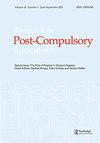英语继续教育中的表演性认知
IF 0.9
Q3 EDUCATION & EDUCATIONAL RESEARCH
引用次数: 2
摘要
在英国教育部门,绩效和问责制实践的概念是有争议的。尽管一些评论家认为,统计驱动的绩效指标与从业者的价值观不一致,但很少有研究调查与工作角色和管理责任水平相关的任何潜在差异。这项研究的重点是,人们对绩效的看法是否会随着工作角色的不同而改变,以及管理者和教师之间是否存在差异。一份电子问卷在一所FE学院分发,调查了107名参与者,涉及广泛的学科领域。定量分析表明,对于有效学习环境不可或缺的驱动因素的统计绩效目标的有效性,管理人员的看法与教学人员的看法不同。然而,结果远非明确。当从业者在他们的角色中承担更多的管理重点时,他们对目标设定和绩效度量的感知利益和亲和力就会增加。然而,这种对绩效更有利的前景的重要性是有限的,管理人员也普遍怀疑目标设定实践可能带来的任何好处和积极影响。本文章由计算机程序翻译,如有差异,请以英文原文为准。
Perceptions of performativity in English Further Education
ABSTRACT The notions of performativity and the use of accountability practices within the UK education sector are contentious. Although some commentators suggest that statistically driven performativity measures do not align with practitioner values, little research has investigated any potential differences in relation to job role and level of management responsibility. This study focused on whether perceptions of performativity change according to someone’s job role and whether there is a differential between managers and teachers. An electronic questionnaire was disseminated at a single FE college, with 107 participants surveyed across a wide range of subject areas. Quantitative analysis revealed that perceptions of managers differ from those of teaching staff regarding the effectiveness of statistical performativity targets to drive factors which are integral to an efficacious learning environment. Results are far from unequivocal though. As practitioners take on more of a managerial emphasis within their role, the perceived benefit of and their affinity for target setting and performativity measures increase. However, the magnitude of this more favourable outlook towards performativity is limited, with managers also broadly sceptical concerning any benefit and positive impact that target setting practices can have.
求助全文
通过发布文献求助,成功后即可免费获取论文全文。
去求助
来源期刊

Research in Post-Compulsory Education
EDUCATION & EDUCATIONAL RESEARCH-
CiteScore
1.30
自引率
14.30%
发文量
31
期刊介绍:
Throughout the world, there is a growing awareness of the significance of vocational and post-compulsory education and training systems. The majority of countries are working hard to develop their provision, recognising the importance of post-compulsory education in providing educated and skilled people in sufficient numbers at appropriate levels to assist economic and social development. Research in Post-Compulsory Education, sponsored by the United Kingdom"s Further Education Research Association (FERA), recognises the need for more international research and analysis and the generation of relevant theory in order to identify policy needs and trends as well as priorities in this growing area.
 求助内容:
求助内容: 应助结果提醒方式:
应助结果提醒方式:


